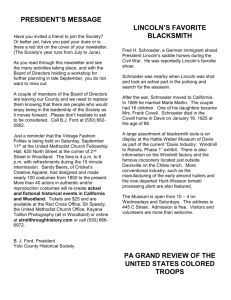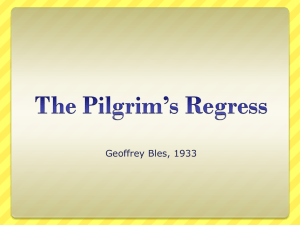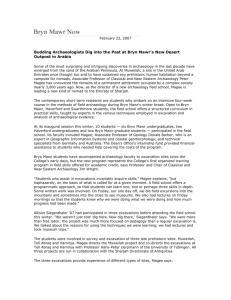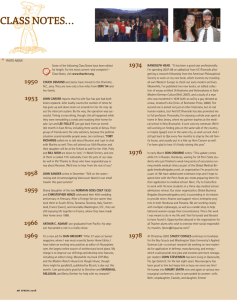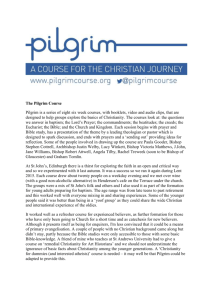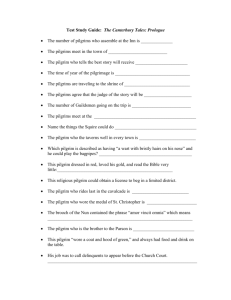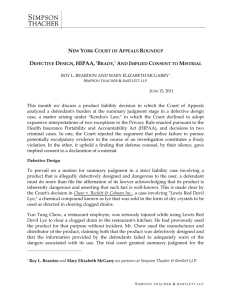To learn more about James Thacher, click here for "A Patriot at
advertisement
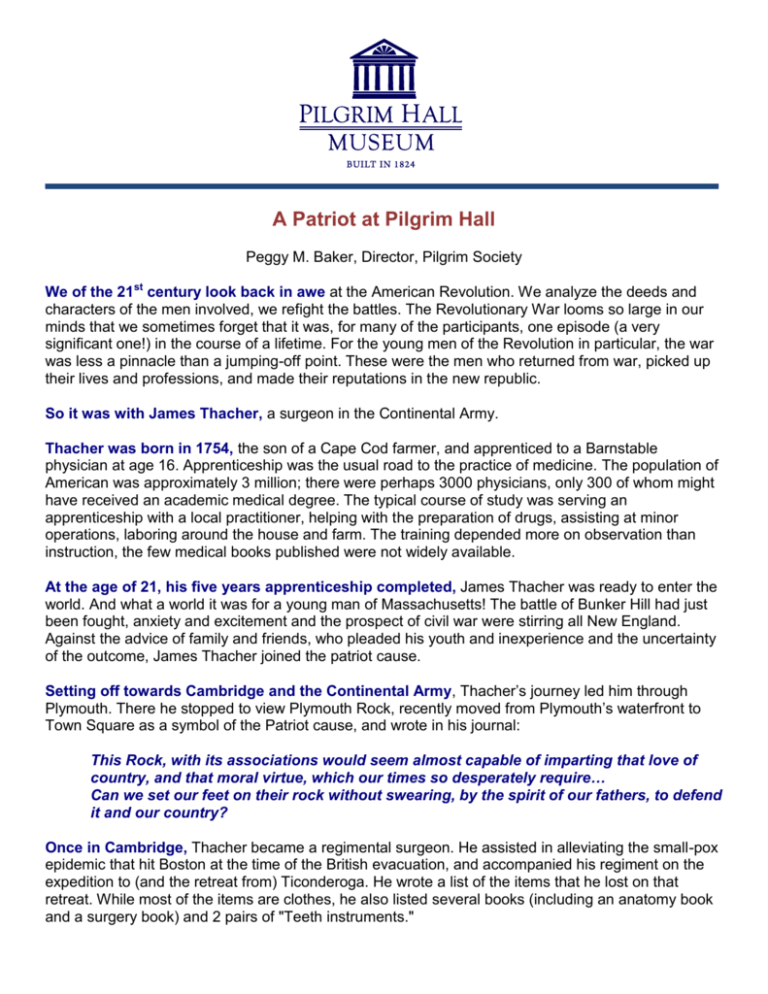
A Patriot at Pilgrim Hall Peggy M. Baker, Director, Pilgrim Society We of the 21st century look back in awe at the American Revolution. We analyze the deeds and characters of the men involved, we refight the battles. The Revolutionary War looms so large in our minds that we sometimes forget that it was, for many of the participants, one episode (a very significant one!) in the course of a lifetime. For the young men of the Revolution in particular, the war was less a pinnacle than a jumping-off point. These were the men who returned from war, picked up their lives and professions, and made their reputations in the new republic. So it was with James Thacher, a surgeon in the Continental Army. Thacher was born in 1754, the son of a Cape Cod farmer, and apprenticed to a Barnstable physician at age 16. Apprenticeship was the usual road to the practice of medicine. The population of American was approximately 3 million; there were perhaps 3000 physicians, only 300 of whom might have received an academic medical degree. The typical course of study was serving an apprenticeship with a local practitioner, helping with the preparation of drugs, assisting at minor operations, laboring around the house and farm. The training depended more on observation than instruction, the few medical books published were not widely available. At the age of 21, his five years apprenticeship completed, James Thacher was ready to enter the world. And what a world it was for a young man of Massachusetts! The battle of Bunker Hill had just been fought, anxiety and excitement and the prospect of civil war were stirring all New England. Against the advice of family and friends, who pleaded his youth and inexperience and the uncertainty of the outcome, James Thacher joined the patriot cause. Setting off towards Cambridge and the Continental Army, Thacher’s journey led him through Plymouth. There he stopped to view Plymouth Rock, recently moved from Plymouth’s waterfront to Town Square as a symbol of the Patriot cause, and wrote in his journal: This Rock, with its associations would seem almost capable of imparting that love of country, and that moral virtue, which our times so desperately require… Can we set our feet on their rock without swearing, by the spirit of our fathers, to defend it and our country? Once in Cambridge, Thacher became a regimental surgeon. He assisted in alleviating the small-pox epidemic that hit Boston at the time of the British evacuation, and accompanied his regiment on the expedition to (and the retreat from) Ticonderoga. He wrote a list of the items that he lost on that retreat. While most of the items are clothes, he also listed several books (including an anatomy book and a surgery book) and 2 pairs of "Teeth instruments." After Ticonderoga, Thacher cared for the wounded in the hospital in Albany. In 1777, this involved amputations and other formidable surgery, all done without anesthetic. Medicine required not just learning and dexterity. It also required courage, stamina and strength of body and mind -- for the doctor and for the patient! Thacher showed sympathy to almost all his patients, having harsh words for only one ("very peevish and impatient under his misfortunes") Benedict Arnold. While in Albany, Thacher met Kosciuszko, Governeur Morris, physician-general William Brown, and General Israel Putnam, and gave a tour of the wards to George Washington. But despite these side benefits, Thacher wanted more active service. He joined the First Virginia Regiment as surgeon, later transferring to the First Massachusetts. When Colonel Alexander Scammel (in more peaceful times, a Plymouth schoolteacher) formed a select corps of light infantry from the most effective New England soldiers for hazardous duty in advance of the main army, Thacher was appointed surgeon. The corps, and James Thacher, were present at the siege of Yorktown and surrender of Lord Cornwallis. Thacher resigned his commission at the end of the War. In 1784, he joined the Society of the Cincinnati, an organization of the officers in George Washington’s army and navy formed for the purposes of fellowship and the support of widows, orphans and impoverished members. The organization exists today, its members being the most direct lineal descendant of those original officers, and has been a strong and gracious supporter of the Pilgrim Society. Thacher had served long and well under difficult circumstances. His time in the military had, however, also served him well. Thacher entered as a provincial young man with a limited education and a rudimentary grasp of medicine. He left with a wealth of professional experience and a wide network of contacts through his association with some of the most distinguished men of Revolutionary America. Home from the war, at age 29, Thacher settled down to civilian life. He moved to Plymouth (where he was to remain for 60 years) in 1784 and married Susannah Hayward. He quickly established a large and prestigious medical practice, not only caring for the sick but also teaching medical students. And he started to write, gaining a national reputation as a medical scholar. To add charm to this admirable resume, James Thacher is approachable on a personal level. Thacher wrote letters – not copied into letterbooks, like the guarded letters of many semipublic figures of the time, but private letters that show us a strong family man. James and Susannah Thacher had 6 children. Only two, Betsey and Susan, lived to adulthood. At Pilgrim Hall, we have a collection of 10 letters written by James Thacher. Many are letters to his daughter Betsey and her husband Daniel Elliott of Georgia. They are the letters of a worried father to a daughter who is moving far away from her New England home. Thacher worries about Betsey traveling over the stormy sea, he worries about the heat and fevers of Georgia, he worries about her being apart from the New England church community. His love shines through in an 1805 letter Nothing that can occupy my mind is capable of affording me such substantial happiness and enjoyment as a correspondence with my absent - my beloved daughter. Thacher’s high reputation in Plymouth, however, stems from more than his Revolutionary War service, his medical expertise, his good nature, and his love for his adopted town of Plymouth. James Thacher was also one of the founders of the Pilgrim Society. During the eighteen-teens, James Thacher had begun to turn away from his medical practice due to his growing deafness. He devoted more and more time to historical interests. This reflected a national surge in historical interest. America’s continued independence, won during the Revolution, had been confirmed with the War of 1812. The new young nation now began to grow and, while it was entering an era of expansion and optimism, it was also entering an era of growing regional tension and divisiveness. America needed direction and inspiration, it needed to find a history of its own, it needed to find unifying themes and a national identity. The Revolution, approaching its 50th anniversary in the 1820s, was one important unifying theme in American history. Newspapers nationwide became filled with the wartime reminiscences of old soldiers. Some Americans, however, including some Revolutionary War veterans, looked even further back in American history to find an earlier unifying theme – the Pilgrims. In this spirit, the Pilgrim Society was founded in Plymouth in 1820. James Thacher was one of the Society’s founding members. He was appointed its first librarian and cabinet (or museum) keeper, before there even was any library or cabinet! In 1823, Thacher published his first historical work – Thacher’s Military Journal, during the American Revolutionary War – a narrative of the events to which he was an eyewitness, over the course of his service during the Revolution. After his complete medical retirement the next year, Thacher turned his keen mind and prodigious energies to Plymouth and Pilgrim history. It was in late 1824 that the Pilgrim Society built Pilgrim Hall Museum. James Thacher now had his library and his cabinet to keep, and keep them he did until his death in 1844 at age 90. While still serving as librarian and cabinet-keeper of the Pilgrim Society, James Thacher continued to write. His History of Plymouth, covering all the significant events from the landing of the Pilgrims to 1832, was the first town history published in the United States. Thacher demonstrated in this history the same qualities he had shown throughout his medical career – extensive reading, much thought and consultation with other knowledgeable people, a respect for the tried-and-true but an openness to new evidence, keen and critical thinking. The story of James Thacher and Plymouth Rock was brought full circle in 1834 when the Rock, which Thacher had viewed with such reverence in 1775, was moved from Town Square to the front lawn of Pilgrim Hall Museum. James Thacher was the founder of a long Pilgrim Society tradition of adherence to rigorous scholarship – a tradition which we are very proud to be continuing. We are proud also to continue keeping his "cabinet," displaying our Pilgrim treasures at Pilgrim Hall Museum and telling the Pilgrim story – the story that James Thacher found so significant in defining the nation that he fought so hard to win.
